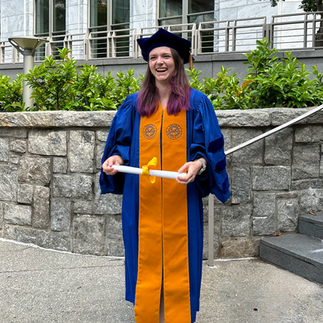
Grady Trauma Project's Alyssa Roeckner successfully defended her thesis titled "Sex Differences in PTSD and the Longitudinal Neural Dynamics of Trauma Exposure" and graduated from Emory University's Neuroscience Graduate Program in Spring of 2024!
Before matriculating to Emory University, Alyssa received her B.S. in Psychology from the University of Dayton and worked for two years as a research coordinator at Cincinnati Children’s Hospital. In Fall 2018, Alyssa started her graduate journey at Emory where she joined the lab of Dr. Jennifer Stevens and the Grady Trauma Project working on the E2 study. During her time at Emory, Alyssa presented at several national conferences, instructed her own research course, and authored many scientific articles. She begins her postdoctoral fellowship at the University of Texas in Austin this Summer 2024. We will miss her but wish her the best of luck on her scientific journey!
Q&A with Dr. Roeckner:
1) Why did you choose to complete your graduate studies at Emory University?
I always wanted to study the neuroscience of stress, and that led me to find the Grady Trauma Project at Emory when I was looking for graduate programs. The research at the Grady Trauma Project excited me, and it was a dream come true when I was able to join the lab!
2) What are some take-home findings from your dissertation?
My dissertation demonstrates that there are changes in brain function, specifically in the amygdala, for people with worse PTSD symptoms following a traumatic event, and brain structural differences for people with worse PTSD symptoms depending on if you are female or male (assigned at birth). We also found some evidence that female hormones may influence brain function in people who have experienced high amounts of trauma.
3) What implications do your findings have for potentially treating PTSD?
The brain potentially undergoes changes in the months following a traumatic event in those with worse PTSD. Earlier, preventative treatment could potentially shift how our brain responds following trauma. Also, we saw differences in female vs male brains following trauma, with hormones impacting female brain function. This means that different treatments for women and men may be needed.
4) What are some future directions you’d like to explore with these data?
It would be great to look more at the impact of female hormones on brain function during other times of the menstrual cycle. We looked specifically at one time during the menstrual cycle, the early luteal phase, but are planning to explore how hormones impact brain function during other times as well.
5) What do you want to be when you grow up?
I'd like to use my work in neuroimaging, stress, and sex differences to find treatment applications for PTSD, potentially through the tech field with virtual reality or biofeedback.
6) Any words of advice for those interested in getting their Ph.D.?
The people you work with make or break your time in graduate school. Find a mentor, lab, and program that supports you, both as a student and as a person.
7) Lastly, what did you do in your free time/for fun in Atlanta/around Emory during graduate school?
I went on long walks and runs with my dog, played video games, read, played Dungeons & Dragons with friends, and went to concerts!
























